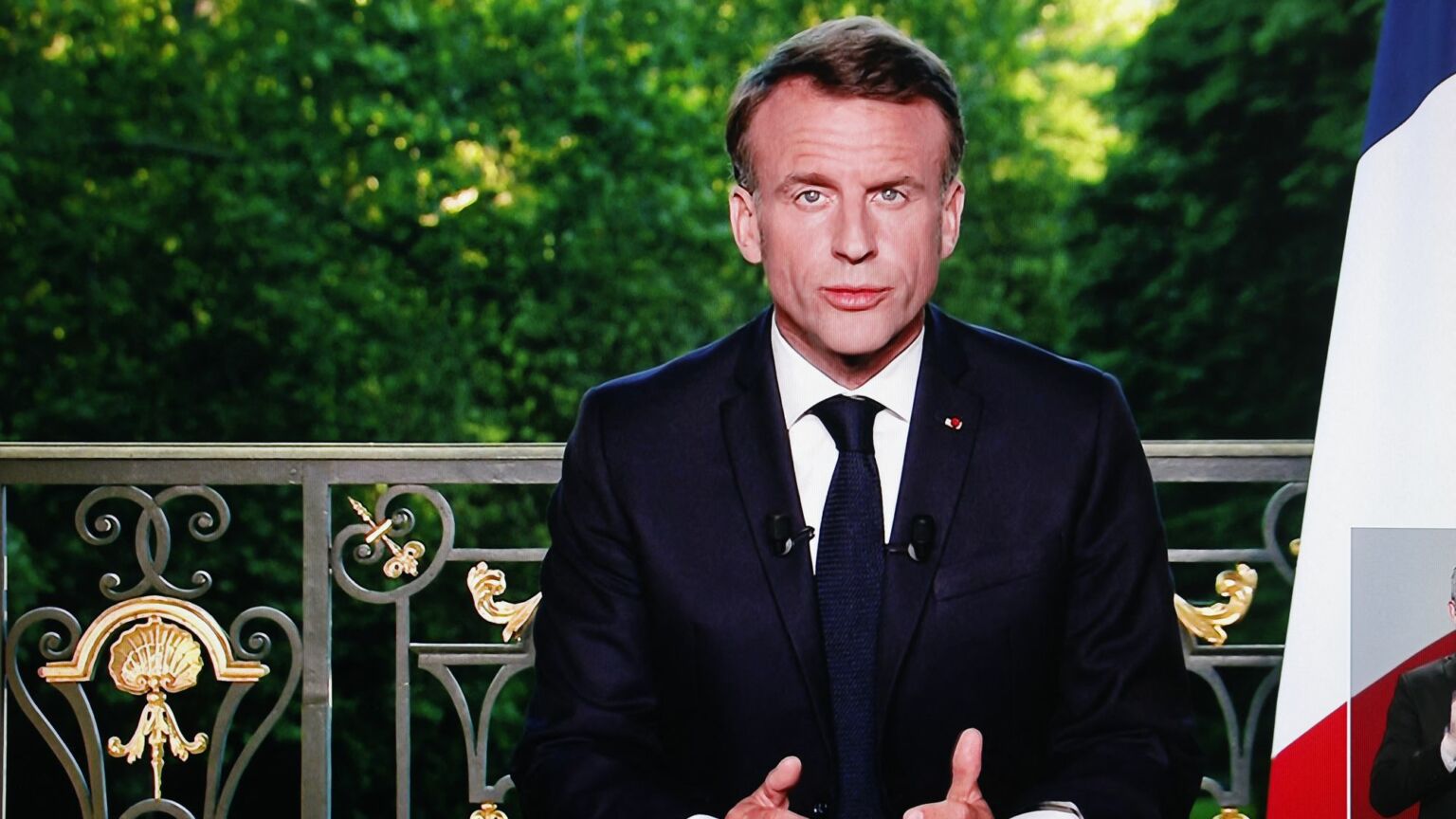The EU has been shaken to its core
Europeans have had enough of the Brussels oligarchy.

Want to read spiked ad-free? Become a spiked supporter.
‘I cannot act as if nothing has happened’, said a weary, dejected Emmanuel Macron, in an unplanned address to his nation last night. The French president, bruised by an unprecedented showing for the right-wing populist National Rally (RN) on Sunday’s European Parliament elections, immediately dissolved the French parliament and announced snap legislative elections. The first round will take place in just three weeks’ time.
When Macron was elected president in 2017, he promised the French people that they will ‘no longer have a single reason to vote for the extremes’. Pro-EU centrists hailed his apparent defeat of nationalist, populist forces. Seven years later, RN is on course to achieve its best-ever result in an EU election. Marine Le Pen’s party is projected to win double the vote share of the president’s liberal, centrist Renaissance group. Clearly, the French feel that they have more reasons than ever to revolt against the mainstream.
The French are not alone in this. The hard-right Alternative for Germany (AfD), despite two of its leading MEP candidates being dogged by major scandals, came second behind the centre-right CDU. Crucially, it beat all three of the parties in Germany’s governing coalition. The Social Democrats (SPD), led by chancellor Olaf Scholz, suffered its worst result of any nationwide election since the 1940s. According to one pollster, around a million people who supported the left-leaning parties in the ‘traffic light’ coalition have since defected to the AfD. Pressure is now mounting on Scholz to call his own snap election. In Italy, meanwhile, Giorgia Meloni and her Brothers of Italy topped the European polls, exceeding the vote share that swept her into power in 2022’s national elections. Populist, right-wing and hard-right parties, therefore, came in first or second place in all three of the major EU nations.
Even Belgium, at the epicentre of the EU empire, has been struck by the populist earthquake. Prime minister Alexander de Croo announced his resignation last night as his party was beaten to below 10 per cent in Sunday’s federal parliamentary elections and to around five per cent in the European elections – squeezed by Flemish separatist parties. Hard-right parties also came first in Austria and second in the Netherlands.
While Macron has been forced to react to the scale of his defeat, acknowledging euphemistically that these elections were ‘not a good result for the parties that defend Europe’, others in the Brussels oligarchy have tried to bury their heads in the sand. On Sunday evening, European Commission president Ursula von der Leyen declared – delusionally – that ‘the centre is holding’.
She is right in one, very narrow, sense. The centre-left Progressive Alliance of Socialists and Democrats (S&D), the centre-right European People’s Party (EPP) and the liberal Renew group have likely gained enough seats between them for business as usual to resume in the European Parliament. The two groupings to their right – the European Conservatives and Reformists (ECR) and Identity and Democracy (ID) – have not made enough gains, even when combined, to start throwing their weight around in Brussels. Von der Leyen’s own position as Commission president is likely secure, not least because her EPP is the single largest grouping in parliament. The new populist MEPs will likely be shut out of key decisions, including the vetting of new EU commissioners. The EU has never allowed the democratic wishes of the public to intrude on its affairs before, so it is unlikely to start now.
But Brussels cannot hide from reality forever. These elections clearly show that the EU and its boosters are failing to contain the public’s anger. European elites have pulled every trick in the book to try to put the brakes on the populist surge, seemingly to little avail.
In recent weeks and months, challenger parties have been denounced in the strongest terms imaginable. Macron last night described the RN as a ‘danger’ to France, and its rising support as a sign of a nation gripped by ‘fever’ and ‘disorder’. He even referenced the D-Day landings to draw a not-so-subtle comparison between his nationalist rivals and the Nazis. In Germany, the AfD has been placed under surveillance by the intelligence services and there are regular calls from high-ranking politicians to ban it outright. The EU itself has tried to curtail the influence of Eurosceptic parties, by classifying their messages as ‘disinformation’ and ‘hate speech’ as a pretext for censoring them.
But despite these attempts to demonise these parties and demoralise the electorate, populist voters are more motivated than ever. The turnout in these elections was up on 2019. France enjoyed its highest turnout at a European election in three decades. This, in itself, spells trouble for the establishment. As Bruno Waterfield, Brussels correspondent for The Times, points out, the EU’s governing consensus has been sustained largely by voter apathy. As turnout in European elections has increased, so has the vote share of parties that reject the EU oligarchy.
These elections have also busted a number of persistent myths about anti-establishment voters. The caricature of these voters as angry, racist Baby Boomers needs to be retired immediately. For one thing, young people, all across Europe, are also rejecting the woke, green Europhile consensus. In France, a third of voters aged 18 to 24 told pollsters they would back RN, led in the European Parliament by 28-year-old Jordan Bardella. (Bardella is tipped to be the next French prime minister, if RN repeats Sunday’s success in the upcoming legislative elections.) In Germany, the centre-left government’s decision to lower the voting age to 16 seems to have backfired spectacularly, with polls putting youth support for the AfD between 18 and 22 per cent – a higher proportion of support than in other age groups.
Nor is the rise of the European right all about immigration, as we so often hear. The EU Green Deal, which includes a vast array of costly and authoritarian measures aimed at bringing down carbon emissions, has infuriated voters across the continent. The fiercest opposition to these Net Zero policies has come from Europe’s farmers, who have staged angry, disruptive protests in just about every EU member state. Right-populists were quick to jump on the bandwagon. Unsurprisingly, parties that have challenged the EU’s climate agenda have tended to make gains in these elections, whereas green parties have faced heavy losses all across the bloc. In Germany, once an environmentalist stronghold, the Green Party’s vote share has nearly halved since the last EU elections. The French greens, Les Ecologistes, only just managed to avoid a total wipeout. In the eyes of the European public, ‘green’ has become a byword for bureaucratic interference and deindustrialisation.
Voters have used these elections to deliver a powerful challenge, both to their complacent rulers at home and to the unelected bureaucracy in Brussels. The mainstream elite consensus – on borders, climate change and ever-greater EU integration – is coming under unprecedented populist pressure. The EU has rarely felt more fragile.
Some of the more deluded commentators are now bashing Brussels’ leaders for ‘pandering to’ and ‘emboldening’ the right, pointing almost exclusively to von der Leyen’s recent attempts to court Meloni. But this turns reality on its head, in two ways. First, the idea that a European Union, doubling down on federalism, greenism, wokeism and anti-populism, has somehow been giving in to the right-populists is obviously for the birds. Second, it is precisely because the elites have ignored voters’ concerns about migration, Net Zero, sovereignty and much else besides that these right-wing – and sometimes genuinely unsavoury – parties have been able to grow their support. With the left having long abandoned the working class, these are the only parties willing to speak to the concerns of ordinary people.
European voters have effectively been given a choice between a mainstream that despises them, a left that has abandoned them (and also despises them), and a right that is promising to give the other two a bloody nose. Are we really surprised by the option they took?
Populism is going nowhere. And that’s a good thing, too. European politics desperately needs democratising. Europe’s elites desperately need to be brought to heel. European voters desperately want to be placed back in the centre of politics. Those concerned that populism has become a boon to rightists, should ask why the territory was so completely surrendered to them.
Fraser Myers is deputy editor at spiked and host of the spiked podcast. Follow him on X: @FraserMyers.

Melanie Phillips and Brendan O’Neill – live and in conversation
Wednesday 26 June – 8pm to 9pm BST
This is a free event, exclusively for spiked supporters.
Picture by: Getty.
Who funds spiked? You do
We are funded by you. And in this era of cancel culture and advertiser boycotts, we rely on your donations more than ever. Seventy per cent of our revenue comes from our readers’ donations – the vast majority giving just £5 per month. If you make a regular donation – of £5 a month or £50 a year – you can become a and enjoy:
–Ad-free reading
–Exclusive events
–Access to our comments section
It’s the best way to keep spiked going – and growing. Thank you!










Comments
Want to join the conversation?
Only spiked supporters and patrons, who donate regularly to us, can comment on our articles.